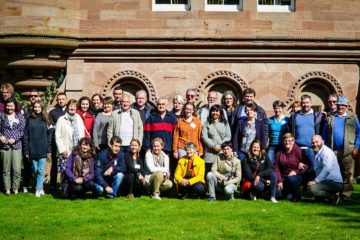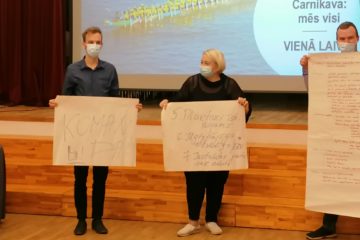“La mobilité pour Tous- Iedereen Mobiel”(1/1/2020 – 30/6/2021) – “Mobility for all”
Project n°23
INTRODUCTION
The project is an interregional LEADER cooperation. The project started with Walloon LAGs visiting Flemish bicycle projects, revealing two cooperation opportunities. First, both regions had campaigns to promote cycling: Flanders focused on mobility poverty with cycling schools, while Wallonia aimed at improving fitness through “Je pédale pour ma forme.” These initiatives inspired mutual exchanges and led to the translation and organization of “train the trainer” programs in both languages. Second, the project explored transport poverty among the elderly in residential care centers. Various adapted bicycles were tested and implemented as additional services for the elderly. Both Walloon LAGs and Leader Hageland tested these bicycles in rural care centers, purchasing at least five with LEADER funds. Pilot projects demonstrated the integration of these bicycles into daily operations, with manuals developed for proper use and management. The collaboration concluded with an event showcasing the experiences and outcomes of the campaigns and adapted bicycle initiatives.
PRESENTATION OF THE PROJECT
First : both regions (Flanders and Wallonia) had awareness campaigns and programs to encourage people to cycle more. In Flanders, the focus is mainly on tackling mobility poverty (establishing cycling schools https://www.defietsschool.be/over-de-fietsschool). In Wallonia, the focus is on encouraging people to exercise more and thereby improve their fitness and health (the program: “Je pédale pour ma forme” https://jppmf.be/). These differences serve as mutual inspiration and lead to an exchange of experiences between the parties. Both Wallonia and Flanders have a “train the trainer” program in their awareness campaigns. Within this collaboration project, the “train the trainer” component was translated into the other language and training sessions have been organized to train interested facilitators.
Secondly : The mutual aim was found, to explore the transport poverty among elderly people in residential care centers, and their possible sustainable solutions . At the start of the cooperation various types of adapted bicycles have been tested and implemented. examples were given of an adapted bicycle as an additional service for the elderly people in a residential care center. Both the Walloon LAG’s and Leader Hageland wished to test the concept in residential care centers in rural areas (LEADER area). Different types of adapted bicycles have been tested during the project. At Least 5 adapted bicycles have been bought by local care centers with the help of LEADER funds.
Adapted bicycles had to be integrated into the daily operations of residential care centers. Within the collaboration, pilot projects have been set up that have served as demonstration projects. When testing these bicycles, manuals have been developed and translated. These were specific manuals for a good use and management of the bikes within the context of an care center, as well for physiotherapist, as for visiting family etc. (Liability, availability & reservation, training, routes, maintenance etc…)
At the end of the collaboration, we organized a closing event where the experiences gained was presented, both in terms of campaigns and in terms of experiences with adapted bicycles.
PRINCIPAL OBJECTIVES
1. Transfer of knowledge to Walloon partners on how to start a cycling school
a. Developing a course in French
b. Training session
c. Starting a cycling school in Aarschot where Walloon partners can follow the process
2. Transfer of knowledge of the project “Je pédale pour ma forme” to existing cycling school initiatives in Flanders. The Flemish Promoter ensured the recruitment of participants, while the Walloon partners provide:
a. Developing basic materials in Dutch
b. Training session
3. Exchange of experiences on the use of different types of adapted bicycles in nursing homes, between the Hageland and other Walloon LEADER groups. Various types of bicycles would be purchased, both in Flanders and Wallonia, user experiences would be systematically recorded, and the existing manual “Iedereen op de fiets”(=cycling for all) would be used.
a. Setting up pilot/demonstration projects with nursing homes
b. Integrating customized bikes into the routine activities of care homes
c. Mapping out adapted cycling routes
d. Recording experiences/use/points of attention
e. Organizing an exchange day
ADDED VALUE OF THE PROJECT
Cycling offers numerous benefits, especially in rural areas where public transportation is limited. By enhancing mobility, cycling can significantly improve the quality of life for rural residents. Tackling rural issues is a core activity of LEADER, and this project has notable social, environmental, and economic impacts.
The rise of electric bikes has made cycling a viable transportation option for a broader population. In rural areas, long distances and geographic challenges can affect the acceptance of cycling as a daily mode of transport. However, electric bikes mitigate these challenges. This project involved cooperation between a Local Action Group (LAG) in Flanders, where the landscape is flat and cycling has long been a political and social priority (infrastructure, safety, awareness, education). Electric bikes enable other rural areas with rugged landscapes to catch up. Knowledge transfer in this new context, supported by LEADER, can accelerate this process. Cooperation also opens new perspectives on health and elderly care, themes relevant across Europe.
1. Benefits of Cycling for Rural Mobility are (part one of the project):
Enhanced Accessibility:
Connectivity: Bicycles provide reliable transportation, connecting residents to essential services like healthcare, education, and shopping, which may be spread over large distances in rural areas. Independence: For those without cars, cycling offers an affordable, independent mode of transport, reducing reliance on others and easing access to work, school, etc.
Economic Benefits:
Cost-Effective: Bicycles are inexpensive to purchase and maintain compared to motor vehicles, making them viable for low-income households and newcomers. Local Economy: Increased cycling can boost local economies by encouraging bike-related businesses, such as repair shops and rental services. Environmental Impact:
Sustainability:
Cycling is eco-friendly, reducing carbon emissions and pollution, contributing to a cleaner, healthier environment.
Land Use: Bicycles require less infrastructure than cars, preserving rural landscapes and reducing the need for extensive road networks.
Health and Wellbeing:
Physical Activity: Regular cycling promotes physical fitness, reducing the risk of chronic diseases like obesity, diabetes, and heart disease.
Mental Health: Cycling can improve mental health by reducing stress and anxiety, and providing opportunities for social interaction and outdoor activity.
2. Adapted Bicycles in Nursing Homes was the second main topic in the project.
Incorporating adapted bicycles into nursing homes offers significant social and therapeutic benefits:
Social Benefits:
Inclusion: Adapted bicycles, such as tricycles or tandem bikes, enable residents with varying mobility levels to participate in cycling activities, fostering inclusion and community.
Interaction: Group cycling activities encourage social interaction among residents, staff, and family members, combating loneliness and isolation.
Therapeutic Benefits:
Physical Rehabilitation: Adapted bicycles can be part of physical therapy programs to improve strength, balance, and coordination, providing low-impact exercise gentle on the joints.
Cognitive Stimulation: Cycling can stimulate cognitive functions by engaging residents in purposeful, enjoyable activities, helping maintain motor skills and coordination.
Emotional Wellbeing: The sense of freedom and accomplishment from cycling can boost self-esteem and overall happiness among residents.
Practical Implementation:
Pilot Projects: Setting up pilot or demonstration projects in nursing homes can assess effectiveness and refine the approach to integrating adapted bicycles.
Customized Routes: Designing specific cycling routes within or around the nursing home ensures safety and accessibility for all participants.
Experience Recording: Systematically recording user experiences and feedback helps continuously improve the program and address any issues.
In conclusion, promoting cycling in rural areas and integrating adapted bicycles in nursing homes can significantly improve mobility, health, and social inclusion. Teaching people to cycle and providing the necessary infrastructure and support can create a more connected, healthy, and vibrant community. These added values can be copied easily across other European Rural area’s.


